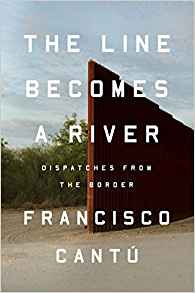 Francisco Cantú, The Line Becomes a River; Dispatches From the Border (New York: Riverhead, 2018), 250pp.
Francisco Cantú, The Line Becomes a River; Dispatches From the Border (New York: Riverhead, 2018), 250pp.
I read Francisco Cantú's powerful memoir at the height of the national outrage about the U.S. treatment of migrants. According to Time magazine (July 13, 2018), "currently, more than 11,800 children, from a few months old to 17, are housed in nearly 90 facilities in 15 states. They are being held while their parents await immigration proceedings or, if the children arrived unaccompanied, are reviewed for possible asylum themselves." In fact, this is a billion-dollar-a-year industry.
Cantú is a third generation Mexican-American, fluent in Spanish, who specialized in international relations, immigration, and border security as a college student and a Fulbright scholar. Much to the horror of his mother, who spent her career as a Park Service ranger, at the age of twenty-three he then became a Border Patrol agent for four years (2008–2012).
He started as a "field agent" in the vast and hostile deserts of Arizona. In the year 2000, agents like Cantú arrested 1.5 million people on the border — those seeking economic opportunity, others trying to reconnect with family, repeat "crossers," delirious and nearly dead "quitters" who had been left behind by their groups, human traffickers, and drug runners of violent cartels who watched Cantú's movements as much as he watched them. He rescued mothers with children, recovered decomposed bodies that were crawling with ants, and processed people into the vast maw of the ICE bureaucracy.
After a year as a field agent, Cantú moved to the sector intelligence headquarters in Tucson. In the comfort of an air-conditioned office, he did "computer stuff" like analyzing human smuggling techniques and crossing patterns. He later moved to the tactical operations headquarters in El Paso. In the last third of the book, after he quit the Border Patrol and thought that he had experienced just about everything, Cantú finds himself on the other side of the table — in detention centers, court rooms and law offices, trying to help a friend who had been arrested and separated from his wife and three children by an agent just like himself.
After four years as a Border Patrol agent, Cantú was plagued by nightmares. His dentist asked him why he was grinding his teeth. Most of all, despite his desire to complement his intellectual studies with a practical knowledge of border security, Cantú developed a stricken conscience. Much of his book is an acknowledgement of his own complicity in a deeply flawed system. Yes, he's the first to acknowledge that the Border Patrol does good and necessary work. But separating children from their parents, it turns out, is only one manifestation of a vast bureaucracy of institutional violence and deadly policies that dehumanize migrants, says Cantú, and in turn dehumanizes our society. His book hopes to change that.


